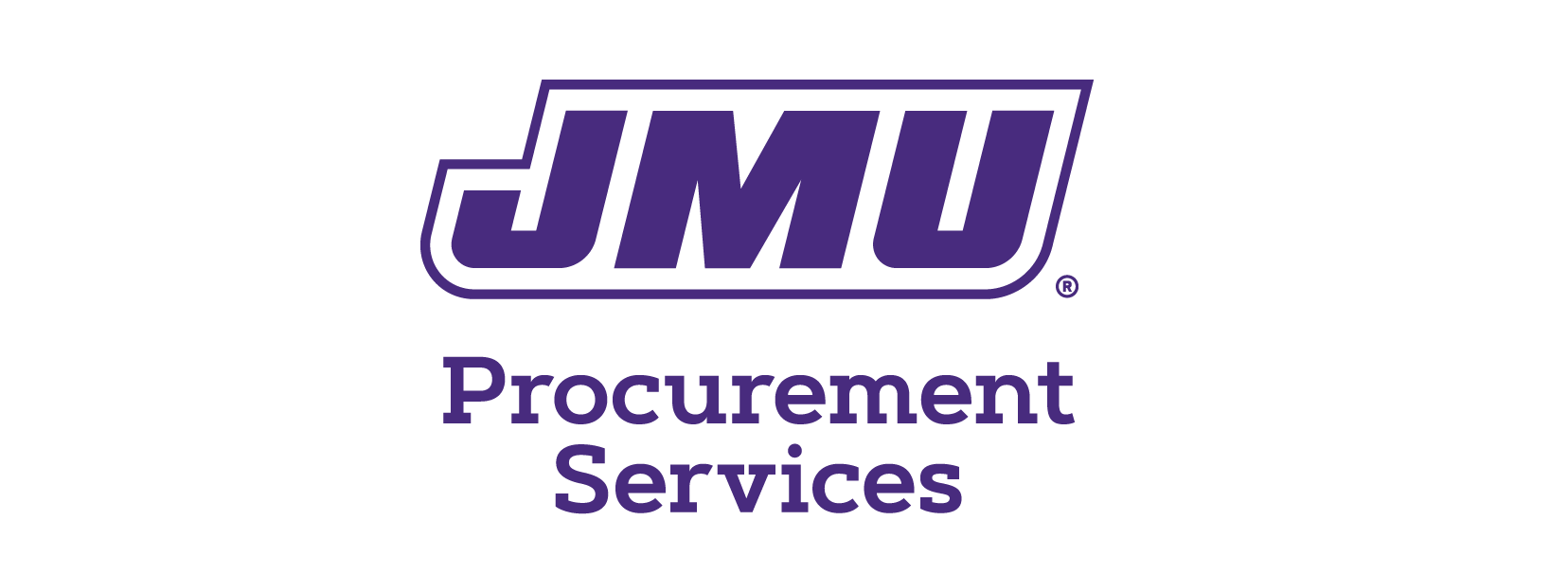All JMU procurement activities are subject to the laws of the Commonwealth and are conducted in accordance with the Rules Governing the Procurement of Goods, Services, Insurance, and Construction (Governing Rules) and the policies of the Virginia Association of State College and University Purchasing Professionals (VASCUPP) as published in the Purchasing Manual for Institutions of Higher Education and their Vendors.
The following policies and procedures apply for all procurements made for James Madison University by faculty, staff, and administrators charged to University funds, including Educational and General, Auxiliary Enterprises, Sponsored Programs (Grants and Contracts) and Local/Agency Fund Accounts.
Procedures
- Purchases up to $10,000
- Purchases between $10,000.01 to $200,000 Revised January 2023
- Purchases over $200,000 Refer to the Higher Education Manual
Policies
Orders that are found to be non-compliant are logged by Procurement Services and at the end of each fiscal year are sent to upper administration. Below is a limited detail view of the report.
On June 4th, 2009, the University and the Commonwealth of Virginia entered into the original memoranda of understanding with the appropriate Cabinet Secretary or Secretaries, as designated by the Governor, granting appropriate operational authority, for the functional areas of information technology and procurement. JMU then received additional Pilot delegation (2.5) in Capital Outlay and some areas of Finance through the 2016 General Assembly session (HB30/Chapter 780). This pilot period for these additional areas was set to last for a five year period, ending on June 30, 2021.
On July 1st, 2019, the Commonwealth of Virginia entered into a management agreement with the appropriate Cabinet Secretary or Secretaries, as designated by the Governor, granting JMU Level III delegation, through the 2019 General Assembly session (HB 2290/Chapter 124 & SB 1386/Chapter 125).
Financial and Administrative Standards
The University shall substantially comply with its annual approved small, women-owned and minority-owned (SWaM) plan as submitted to the Department of Small Business and Supplier Diversity (SBSD); however, a variance of 15 percent from its SWaM purchase goal, as stated in the plan, will be acceptable. The University will make no less than 75 percent of the annual spend through the Commonwealth's enterprise-wide internet procurement system (eVA) from eVA self-registered vendors.
Campus departments are provided with delegation to purchase goods and/or services costing $10,000.00 or less (this delegation does not include the purchase of restricted items or the signing of contracts).
While the official Departmental Delegation is $10,000.00, departments may receive one quote/proposal from a Micro-small, Small, Women-owned, or Minority-owned business (certified by the Virginia Department of Small Business & Supplier Diversity - SBSD) that is also an eVA self-registered vendor up to $50,000. The department will process the requisition in eVA (prior to any notification of award to the vendor), including any quote/proposal received. Procurement Services will then verify the vendor is certified with SBSD and is an eVA, self-registered vendor. If both criteria are met, Procurement Services will approve the order without the need to seek further competition. If both criteria are not met, Procurement Services will follow internal normal procedures which may include competitively soliciting the goods/services. Confirming orders or split orders to remain under the $50,000 limit are prohibited.
Purchases must be made in accordance with all University policies and procedures. Delegation can be revoked by the Director of Procurement Services if the department, or individual within a department, does not follow proper procedures.
Departments should never split orders. Splitting orders is when multiple purchases are made to the same vendor exceeding purchasing delegation within a relatively close period of time. Procurement monitors eVA for this type of activity.
Department Responsibilities:
- Make authorized procurements according to University policy and procedures
- Ensure an individual with signature authority on the departmental ID/org has approved the procurement/purchase
- Confirm that sufficient funds exist in the department's budget at the time of purchase
- Maintain department records to avoid duplicate orders
- Ensure the University is obtaining the best possible value when procuring goods and services
- Perform procurement actions timely to preclude the need for special action or granting of exceptions
- Reconcile departmental purchase records on a monthly basis. Refer to Financial Procedures Manual, Section 3035 - Reconciliation Guidelines for guidance
- Prior to initiating any procurement that may modify, repair, renovate, or alter any campus facility, major equipment or building system, departments should consult JMU Policy 4302 - Facility Modification/Maintenance for instructions
- In accordance with JMU Policy 1201 - Information Technology Resource Management, JMU Policy 1202 - Information Systems Implementation & Project Management, & JMU Policy 1204 - Information Security, departments are required to contact JMU IT prior to initiating an IT procurement by submitting a Technology Solution Request (TSR)
- Include opportunity for small, women-owned, and minority-owned (SWaM) businesses in procurement
- Utilize eVA Self-Registered vendors
- Forward all goods and services contracts/agreements needing signature to Procurement JMU Policy 4100 - Signature Authority on Contracts
- Inspect all goods immediately upon receipt and confirm items are in accordance with the order and free from damages and/or certify services received were in accordance with the agreement
Departments are not authorized to:
- Instruct a consultant, contractor, or service technician to start work before the agreement is fully executed and the purchase order is issued
- Change the scope of an agreement without following the formal purchase document amendment processes
- Direct a consultant, contractor, or service technician to perform work that is not specifically described in and funded by an agreement
- Extend the time period of an agreement without execution of an approved amendment or purchase order revision
- Allow a consultant, contractor, or service technician to incur any additional costs over the limit set by an agreement
- Sign an agreement unless explicitly authorized to do so by the James Madison University JMU Policy 4100 - Signature Authority on Contracts. (Departments that receive a document requiring signature should forward the document to Procurement for processing).

